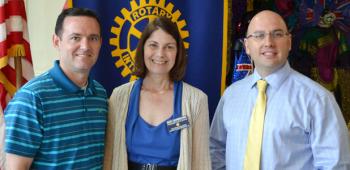
Stephen Broussard, left, a colorectal cancer survivor, spoke to the Rotary Club of Crowley Tuesday, promoting awareness of the disease. He was welcomed by Club President Mary Zaunbrecher, center, and program organizer Trey Signorelli, right.
For colorectal cancer, early detection is key
Jeannine LeJeune is the online editor for the Crowley Post-Signal. She can be reached at jeannine.lejeune@crowleytoday.com or 337-783-3450.
In life, timing is everything.
For Stephen Broussard, unanswered health questions came to a head in December, 2012.
“The only sign I ever had was some blood in my stool, for about three months,” said Broussard. “I was going to Dr. Chad Vincent, and we treated it for internal hemorrhoids; we treated for colitis; we treated for diverticulitis, and nothing seemed to do the trick.”
After months of trying and testing, Broussard had met his insurance deductible, and he and Dr. Vincent opted for answers through the colonoscopy.
“That’s when we found out.”
Speaking to Rotary Tuesday, Broussard talked about his diagnosis, his treatment and how he has become very involved in colon cancer awareness, in particular, the Colon Club.
His program comes right in the middle of March, perfect timing as March is Colon Cancer Awareness Month.
Colon cancer was not a topic of discussion in Broussard’s family, but after his diagnosis, he explained, it is now.
“In my family, growing up, we never really talked about colon cancer,” he said. “I had a great-aunt that passed away from it, but it wasn’t something we talked about around the dinner table.
“It is now, in our family; quite often.”
Acadiana, Broussard explained, has a higher colon cancer rate than anywhere else in Louisiana, 13 percent higher to be exact. It is 23 percent higher than the national numbers.
“That should raise your eyebrows a bit,” he said. “This is among us and it will, in some way, shape or form, one day affect you.
“I never thought it would affect me, not in this way, but it has.”
After being diagnosed, Broussard got online and started researching colon cancer which brought him to The Colon Club, which featured information as well as forums for colon cancer survivors to share stories and information on.
“It became a daily habit for me,” he said.
So much so that this year’s Colon Club calendar, the appropriately named “Colondar,” features Broussard.
Broussard, along with the 11 other participants were flown to Nashville for the photo shoot and given roughly four pages in the magazine/calendar combination to tell their story.
“We pretty much became a family,” said Broussard. He added that the group of them still talk or text daily among t hemselves.
There is one somber exception to that group of 12 as one of the calendar “models” passed away in February, just a month away from the new calendar’s launch in March.
Broussard, who represents June in the “Coloncar,”, tells his story of the disease.
He is the only one shirtless in the magazine, but that was not by design. The magazine calendar shows the survivor’s scars. The muscle shirt uniform that everyone else wears allows for their scars to be shown. Broussard, who was diagnosed with Stage IV cancer upon diagnosis has had six surgeries and the shirt covered the scars from those surgeries.
“I had so many scars they couldn’t get all the scars in with the shirt on,” he said.
“It’s not by choice believe me.”
It is part of The Colon Club’s work to spread awareness of the disease that is not just the “old man’s disease” any longer. Broussard would know, he was 33 when diagnosed. The others in the Colondar also weren’t yet 50 years old.
“As long as I’ve known about (colon cancer), it’s been known as an elderly person’s disease, or ‘the old man’s disease’,” he said. “It’s no longer that.”
The Colon Club is also busy this month as it has sent several representatives to Washington, D.C., this month for “Colon Congress,” helping raise disease awareness and lobbying for support from Congress as the disease is continued to be fought.
Broussard, meanwhile, is doing his part to raise awareness locally.
“This disease is very preventable,” he said.
Broussard urged everyone to get their colonoscopies and keep up with the screenings.
“Please, if you haven’t been screened, get screened. If you have, and it’s been a while, go back.”
- Log in to post comments
